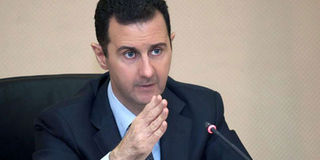Syria's Assad, hated by the West but defended by Russia

Syria's President Bashar al-Assad heads a cabinet meeting in the Presidential palace in Damascus on February 12, 2013. The Soviet Union was a major supporter of Assad's father. PHOTO | AFP
What you need to know:
- The Assad clan hails from the minority Alawite sect, an offshoot of Shiite Islam, in a country with a large Sunni majority.
- Experts say this unwavering belief has helped him to maintain a firm grip on power despite the raging conflict.
DAMASCUS
Syrian President Bashar al-Assad, who has denied ordering last week's suspected chemical attack on a rebel-held town, believes his victory is inevitable in the six-year-old war ravaging his country.
Bolstered by the steady support of Russia and Iran, Assad has appeared unfazed by Western threats to his regime — even after one of his airbases was hit last week by a barrage of American cruise missiles.
The suffering of Syria's people "is the only thing that could deprive me from sleep from time to time, but not the Western statements and not the threat of the support of the terrorists," he told AFP on Wednesday.
Dressed in a sharp suit, he looks more like a senior civil servant or bank manager than the autocratic leader of a country at war.
ALAWITE MINORITY
But Assad remains determined to emerge from the Syrian conflict a victor.
"It has always been a struggle for life and death. There was no question of stopping this war. It was either win or lose," said Nikolaos van Dam, a former Dutch ambassador and Syria expert.
The 51-year-old former ophthalmologist's life changed radically when his brother Bassel, groomed to inherit power from their father, Hafez, was killed in a road accident in 1994.
Assad had to leave London, where he had met his wife Asma, a British-Syrian and Sunni Muslim who worked for financial services firm J.P. Morgan.
The Assad clan hails from the minority Alawite sect, an offshoot of Shiite Islam, in a country with a large Sunni majority.
Assad was tutored in politics by his father, who ruled Syria with an iron fist from 1971 until his death in 2000.
"The regime has half a century of experience of how to stay in power. It has the support of the army and security services," van Dam said.
ARAB SPRING
Assad has two sons and a daughter, and says he still lives in his Damascus home, drives the children to school and goes to work in his downtown office.
US Secretary of State Rex Tillerson told reporters this week that it appeared the "reign" of the Assad family was ending.
"There is no reign of Assad family anyway in Syria," Assad told AFP.
"He's dreaming, or let's say, he's hallucinating, so, we don't waste our time with his statement."
When Assad came to power in 2000, he relaxed some of the heavy restrictions on freedom that existed under his father.
But as the Arab Spring reached Syria in March 2011, he responded with a brutal crackdown, labelling it a "terrorist" conspiracy aimed at breaking the "axis of resistance" against Israel.
Since then, 320,000 people have been killed and more than half the population has been forced from their homes — but Assad has shown no inclination to step down.
"Assad advisers maintained from the beginning that they were confident of success so long as the United States Air Force did not bomb Damascus or get involved in the war," said Joshua Landis, director of the Centre for Middle East Studies at the University of Oklahoma.
STEADFAST
But even after the US strike on the Shayrat air base, Assad remains convinced of his victory.
Experts say this unwavering belief has helped him to maintain a firm grip on power despite the raging conflict.
"He was from the same school as his father, and this school has always understood the importance of time, how to turn bad headwinds into good," said Waddah Abed Rabbo, editor-in-chief of Syria's influential Al-Watan daily newspaper.
Still, the key to his victory, Abed Rabbo and others said, was the steadfast support Assad was able to count on from his foreign allies.
"He never doubted his victory because he knew that his country had for decades nourished a solid strategic alliance with Russia, Iran and others," he said.
Those alliances date back decades.
The Soviet Union was a major supporter of Assad's father, and Syria's ruling elite has long had close ties with Shiite-dominated Iran.





